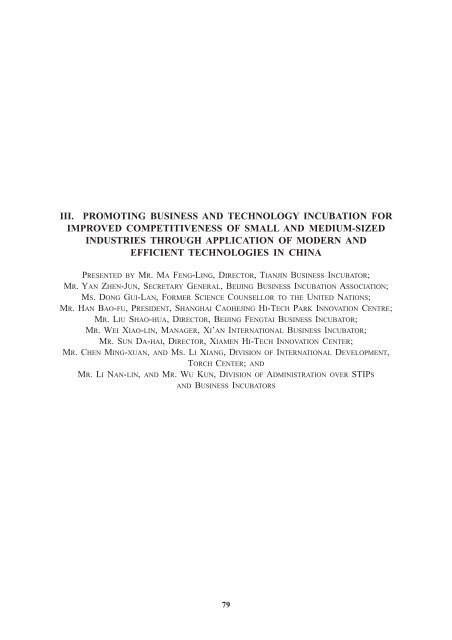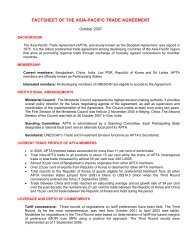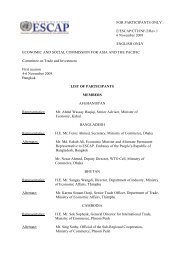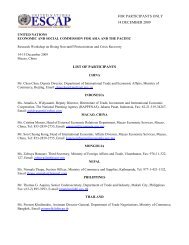iii. promoting business and technology incubation for ... - Escap
iii. promoting business and technology incubation for ... - Escap
iii. promoting business and technology incubation for ... - Escap
Create successful ePaper yourself
Turn your PDF publications into a flip-book with our unique Google optimized e-Paper software.
III. PROMOTING BUSINESS AND TECHNOLOGY INCUBATION FOR<br />
IMPROVED COMPETITIVENESS OF SMALL AND MEDIUM-SIZED<br />
INDUSTRIES THROUGH APPLICATION OF MODERN AND<br />
EFFICIENT TECHNOLOGIES IN CHINA<br />
PRESENTED BY MR. MA FENG-LING, DIRECTOR, TIANJIN BUSINESS INCUBATOR;<br />
MR. YAN ZHEN-JUN, SECRETARY GENERAL, BEIJING BUSINESS INCUBATION ASSOCIATION;<br />
MS. DONG GUI-LAN, FORMER SCIENCE COUNSELLOR TO THE UNITED NATIONS;<br />
MR. HAN BAO-FU, PRESIDENT, SHANGHAI CAOHEJING HI-TECH PARK INNOVATION CENTRE;<br />
MR. LIU SHAO-HUA, DIRECTOR, BEIJING FENGTAI BUSINESS INCUBATOR;<br />
MR. WEI XIAO-LIN, MANAGER, XI’AN INTERNATIONAL BUSINESS INCUBATOR;<br />
MR. SUN DA-HAI, DIRECTOR, XIAMEN HI-TECH INNOVATION CENTER;<br />
MR. CHEN MING-XUAN, AND MS. LI XIANG, DIVISION OF INTERNATIONAL DEVELOPMENT,<br />
TORCH CENTER; AND<br />
MR. LI NAN-LIN, AND MR. WU KUN, DIVISION OF ADMINISTRATION OVER STIPS<br />
AND BUSINESS INCUBATORS<br />
79
A. Review of the new China’s development in economy <strong>and</strong> <strong>technology</strong><br />
1. Economic development of the new China<br />
China founded after the World War II was a poor <strong>and</strong> backward agricultural country. From 1949 to 1977,<br />
under the system of centralized planning entirely by the Central Government, the national economy experienced<br />
a period of recovery, a period of the high tide of large-scale construction, a period of adjustment <strong>and</strong> a period of<br />
slow development in the ten years of the Great Cultural Revolution. Because of the poor foundation <strong>and</strong> the<br />
restriction of the planned economy system, China’s economy was always at a state of backwardness. Especially<br />
<strong>for</strong> the influence of the Great Cultural Revolution, China’s economy was at the brink of collapse.<br />
China’s pursuance of re<strong>for</strong>m <strong>and</strong> opening up policy from the end of the 1970s <strong>and</strong> her gradual transition<br />
from the socialist planned economy to the socialist market economy with Chinese characteristics have put the<br />
national economy on a track of continuous rapid <strong>and</strong> healthy development. The annual average growth rate of<br />
China’s GDP was 9.3 per cent, which was three times of the average growth rate of the whole world economy,<br />
two times of the average growth rate of the developing countries <strong>and</strong> four times of the developed countries<br />
in the same period. According to the report of the World Bank, China’s GDP leaped to the 7 th place in<br />
the world in 1997, thereby becoming an important <strong>for</strong>ce in the world economy. In 2001, China’s GDP was up to<br />
Y 9,593.3 billion (US$ 1,200 billion). China’s economy has been greatly strengthened; the Chinese people are<br />
becoming better off; <strong>and</strong> the supply of commodities has been in abundance. In 2001, the amount of <strong>for</strong>eign<br />
investment absorbed by China was US$ 46.8 billion, up by 14.9 per cent; the international payments were<br />
balanced; the year-end national <strong>for</strong>eign exchange reserve was US$ 212.2 billion, up by US$ 46.6 billion from the<br />
end of the preceding year; <strong>and</strong> the consumption level of individual residents raised by 0.7 per cent 1 . China’s<br />
economy has been integrated in the world economic development. China today is surprising the world with the<br />
great scale <strong>and</strong> high speed of her change <strong>and</strong> the vigour <strong>and</strong> vitality of her growth.<br />
2. Review of New China’s science <strong>and</strong> <strong>technology</strong> development<br />
Under the planned system, S&T <strong>and</strong> industry were separated from each other, many R&D achievements<br />
were only samples, gifts, <strong>and</strong> items on display. Since the pursuance of re<strong>for</strong>m <strong>and</strong> opening up to the outside<br />
world, the Government of China has resolutely insisted on the strategy of “relying on science <strong>and</strong> education to<br />
rejuvenate the nation”, which has made China’s science <strong>and</strong> <strong>technology</strong> enter a period of rapid development. In<br />
1978, China held a national science conference; in 1988, Deng Xiaoping advanced the idea “science <strong>and</strong> <strong>technology</strong><br />
are the primary productive <strong>for</strong>ce”; in 1985, China implemented system re<strong>for</strong>m in science <strong>and</strong> <strong>technology</strong> <strong>and</strong><br />
<strong>for</strong>mulated <strong>and</strong> followed the policy that “science <strong>and</strong> <strong>technology</strong> must be relied on <strong>for</strong> economic development<br />
<strong>and</strong> science <strong>and</strong> <strong>technology</strong> must be oriented to economic development”. The most essential purpose of the<br />
policy is to rapidly <strong>and</strong> extensively apply science <strong>and</strong> <strong>technology</strong> achievements to industrial production, give full<br />
play to the role of scientific <strong>and</strong> technological personnel, <strong>and</strong> greatly liberate the productive <strong>for</strong>ce of science <strong>and</strong><br />
<strong>technology</strong> so as to facilitate the growth of economy <strong>and</strong> progress in society. The Government of China has<br />
unceasingly propelled R&D institutes, educational institutions <strong>and</strong> production units to cooperate to <strong>for</strong>m<br />
a mechanism of synergy that integrate scientific research, design, production <strong>and</strong> service <strong>for</strong> trans<strong>for</strong>mation of<br />
science <strong>and</strong> <strong>technology</strong> towards direct productive <strong>for</strong>ce. The said policy has strengthened independent development<br />
capacity towards the economic construction, market <strong>and</strong> society of scientific research institutions, especially<br />
technological development institutions, <strong>and</strong> strengthened the linkage between <strong>technology</strong> <strong>and</strong> economy. A large<br />
group of new-type high-tech enterprises have spun off from scientific <strong>and</strong> technological institutions <strong>and</strong> become<br />
an important <strong>for</strong>ce <strong>and</strong> a new source of economic growth in China’s development of the high-tech industry. The<br />
situation of unreasonable distribution of talents <strong>and</strong> waste of human resources has been changed to a great extent.<br />
A lot of scientific <strong>and</strong> technological personnel have left their ivory tower <strong>and</strong> begun operating enterprises through<br />
way of contracting or leasing. Participating in fierce market competition, they have become technological<br />
entrepreneurs who not only have scientific <strong>and</strong> technological knowledge but also are proficient in management.<br />
From rice gene database, human genome programme <strong>and</strong> functional genome research in basic research to<br />
important industrial achievements with proprietary intellectual property rights (e.g., integrated computer <strong>technology</strong>,<br />
1 China, Government Work Report <strong>for</strong> the National People’s Congress, 2002.<br />
81
communication <strong>technology</strong>, network <strong>technology</strong>, microelectronics <strong>technology</strong> <strong>and</strong> cryptographic <strong>technology</strong>), many<br />
great achievements have been made in the development of science <strong>and</strong> <strong>technology</strong>. The development of science<br />
<strong>and</strong> <strong>technology</strong> has given momentum to China’s economic development <strong>and</strong> become an inexhaustible driving<br />
<strong>for</strong>ce <strong>for</strong> the progress of the nation.<br />
B. The launch <strong>and</strong> development of <strong>technology</strong> <strong>business</strong> incubators 2<br />
The Government of China has implemented the Torch Program <strong>and</strong> identified science <strong>and</strong> <strong>technology</strong><br />
industrial parks (hereinafter referred to as STIPs) <strong>and</strong> <strong>technology</strong> <strong>business</strong> incubators as means to industrialize<br />
<strong>technology</strong> <strong>and</strong> to enhance the competitiveness of small <strong>and</strong> medium-sized enterprises.<br />
1. Implementation of the Torch Program<br />
Approved by the State Council in August 1988 <strong>and</strong> implemented by the Ministry of Science <strong>and</strong> Technology<br />
(MOST), the Torch Program is a guiding programme <strong>for</strong> the development of China’s high <strong>and</strong> new <strong>technology</strong><br />
industry. The core mission of the Torch Program is to give scope to the advantages <strong>and</strong> potentials of China’s<br />
scientific <strong>and</strong> technological <strong>for</strong>ces <strong>and</strong> accelerate commercialization of high <strong>and</strong> new <strong>technology</strong> achievements,<br />
industrialization of high <strong>and</strong> new <strong>technology</strong> products <strong>and</strong> internationalization of the high <strong>and</strong> new <strong>technology</strong><br />
industry with market as the orientation. The focus of the Torch Program is to create an environment favourable<br />
<strong>for</strong> the development of high <strong>and</strong> new <strong>technology</strong> industry, which include such initiatives as <strong>for</strong>mulation of related<br />
policies, laws <strong>and</strong> regulations, establishment of a suitable management <strong>and</strong> operation system <strong>for</strong> high-tech industry,<br />
exploration of new financing channels including venture capital investment mechanism, developing domestic <strong>and</strong><br />
<strong>for</strong>eign in<strong>for</strong>mation sources, building in<strong>for</strong>mation networks <strong>and</strong> <strong>for</strong>mulate long <strong>and</strong> mid-term development plans<br />
as well as implementation plans consistent with objective reality.<br />
2. The launch <strong>and</strong> development of science <strong>and</strong> <strong>technology</strong> industrial parks 3<br />
In 1984, MOST, then called the State Science <strong>and</strong> Technology Commission, submitted to the State<br />
Council a report on how to respond to the challenges of the worldwide new <strong>technology</strong> revolution. This<br />
document proposed to tentatively establish STIPs in cities with appropriate conditions <strong>and</strong> requested relevant<br />
departments of the State Council to <strong>for</strong>mulate preferential policies towards STIPs <strong>and</strong> <strong>business</strong> incubators. That<br />
was the first time when the concept “<strong>business</strong> incubator” was mentioned by a government department. Thereafter,<br />
MOST supported a research project to study <strong>business</strong> incubator <strong>and</strong> make relevant investigations. China’s<br />
decision on system re<strong>for</strong>m in science <strong>and</strong> <strong>technology</strong> was announced in March 1985. The announcement of this<br />
decision provided broad space <strong>for</strong> scientific <strong>and</strong> technological personnel to start new <strong>business</strong>es. China’s first<br />
STIP was established in Beijing in May 1988. By the end of the 1980s, the stress of STIPs began to shift to the<br />
development of high <strong>and</strong> new <strong>technology</strong> enterprises <strong>and</strong> modern industries, the absorption of <strong>for</strong>eign capital <strong>and</strong><br />
the expansion of <strong>for</strong>eign trade <strong>and</strong> export.<br />
STIPs have become the most vigorous source of growth in China’s economic development. After more<br />
than ten years of building-up, various STIPs of China have realized continuous rapid economic growth through<br />
unceasingly improving their environments <strong>for</strong> innovation <strong>and</strong> new <strong>business</strong> creation <strong>and</strong> trying to promote the<br />
commercialization <strong>and</strong> industrialization of scientific achievements. In recent years, nearly 6,000 scientific<br />
achievements of provincial/ministerial level or above have realized industrialization in high <strong>and</strong> new <strong>technology</strong><br />
zones. The proportion of the output value of China’s high <strong>and</strong> new <strong>technology</strong> industry in the total industrial<br />
output value has increased from about 1 per cent ten years ago to more than 10 per cent at present <strong>and</strong> 50 per<br />
cent of the output value of the high <strong>and</strong> new <strong>technology</strong> industry is contributed by STIPs. By the end of 2000,<br />
the output value of products in the six technological fields of electronic in<strong>for</strong>mation, biology, new materials, new<br />
energy, environmental protection <strong>and</strong> optical-mechanical-electrical integration accounted <strong>for</strong> 73 per cent of the<br />
2 Business incubators in China are sometimes called <strong>incubation</strong> centres, innovation centres or pioneer parks. Different designations<br />
may appear in the following chapters due to translation differences.<br />
3 In China, science <strong>and</strong> <strong>technology</strong> industrial parks are also called high <strong>and</strong> new <strong>technology</strong> zones, referring to a certain area<br />
designed by the government <strong>for</strong> concentration of hi-tech companies, special policies <strong>and</strong> good infrastructure are provided to the<br />
certified hi-tech companies located inside it.<br />
82
total industrial output value of STIPs; the total technological, industrial <strong>and</strong> trade income of the 53 national level<br />
STIPs was up to Y 920.9 billion; their total industrial output value was Y 794.2 billion; the total amount of their<br />
profits <strong>and</strong> taxes was Y 105.7 billion; <strong>and</strong> the amount of <strong>for</strong>eign exchange they earned through exporting<br />
products was US$ 18.58 billion.<br />
3. The origin of China’s <strong>technology</strong> <strong>business</strong> incubators<br />
At the end of the 1980s, with the deepening of China’s re<strong>for</strong>ming in science <strong>and</strong> <strong>technology</strong> <strong>and</strong> economic<br />
restructuring as well as her policy of opening up to the outside world, the situation especially the trans<strong>for</strong>mation<br />
of scientific achievements necessitated the birth of <strong>technology</strong> <strong>business</strong> incubators. In 1987, Mr. Rustam Lalkaka,<br />
then Director, United Nations Fund <strong>for</strong> Science <strong>and</strong> Technology Development (UNFSTD) made a suggestion to<br />
the Science <strong>and</strong> Technology Minister of China at that time to set up <strong>technology</strong> <strong>business</strong> incubators in China. In<br />
the same year, funded by UNDP <strong>and</strong> the Government of China, the National Research Centre <strong>for</strong> Science <strong>and</strong><br />
Technology <strong>for</strong> Development conducted a study on the feasibility of establishing <strong>business</strong> incubators – high <strong>and</strong><br />
new <strong>technology</strong> incubators in China. Wuhan, Tianjin, Guangzhou, Shenzhen, Xi’an Jiaotong University <strong>and</strong><br />
Shanghai also carried out similar studies. In June 1987, China’s first <strong>business</strong> incubator – Wuhan Donghu<br />
Pioneers Centre was <strong>for</strong>mally established. Since then, <strong>business</strong> incubators have sprung up in China.<br />
Nearly 30 <strong>business</strong> incubators were successively established in China during 1989-1990. In 1991,<br />
a group of <strong>business</strong> incubators with their own floor space were successively established <strong>and</strong> put into operation in<br />
Tianjin, Chengdu <strong>and</strong> some other places. At that time, there were nearly 40 <strong>business</strong> incubators in the whole<br />
country; more than 300 start-up companies <strong>and</strong> more than 1,000 high <strong>and</strong> new <strong>technology</strong> achievements<br />
were nurtured in the <strong>business</strong> incubators; the value of the <strong>business</strong> incubators’ fixed assets <strong>and</strong> funds exceeded<br />
Y 100 million; <strong>and</strong> the first group of tenant companies began graduating.<br />
4. Periods of development of China’s <strong>technology</strong> <strong>business</strong> incubators<br />
China’s high-tech <strong>business</strong> incubators have generally experienced the following two important periods of<br />
development.<br />
(a)<br />
The period of classic development<br />
This was the first period of development of <strong>business</strong> incubators. The main characteristic of this period<br />
was that the government offered special policies <strong>for</strong> supporting the establishment <strong>and</strong> development of incubators<br />
<strong>and</strong> made heavy investment in building the most basic facilities needed by the incubators. The incubators laid<br />
their stress on trans<strong>for</strong>ming the existing scientific achievements <strong>and</strong> nurturing the existing small enterprises, by<br />
providing physical facilities <strong>and</strong> various junior consulting. They paid more attentions to social benefits rather<br />
than direct economic benefits. Institutionally, as self-reliance organizations independently responsible <strong>for</strong> their<br />
own incomes <strong>and</strong> expenses, the incubators gradually evolve into corporate management. This period lasted <strong>for</strong><br />
about 10 years. The most pre-eminent achievements of the incubators in this period were as follows:<br />
(i) The trans<strong>for</strong>mation rate of scientific achievements into production increased from a national average<br />
level of 25 to 30 per cent to more than 70 per cent.<br />
(ii) The survival rate of small high-tech companies was greatly increased. According to many countries’<br />
estimation, in the condition of market competition, the survival rate of start-up enterprises is generally less than<br />
30 per cent. However, after nurturing by <strong>business</strong> incubators, the survival rate of newly-started companies is<br />
generally more than 80 per cent.<br />
In this period, the incubators mainly adopted primary financial measures (e.g., guarantee of credit, offering<br />
loans or equity investment) to support tenant companies <strong>and</strong> used individual ef<strong>for</strong>ts <strong>and</strong> primary methods<br />
(e.g., in<strong>for</strong>mation release, exhibition, etc.) to assist the tenant companies to develop markets <strong>for</strong> their products.<br />
In addition, the incubators also provided some administrative supports to tenants. The incubators laid stress on<br />
trans<strong>for</strong>mation <strong>and</strong> cultivation of existing scientific achievements or existing small companies. The development<br />
of incubators in this period was characterized by the high trans<strong>for</strong>mation rate of scientific achievements, the high<br />
survival rate of small new <strong>technology</strong> companies, the low success rate of enterprises <strong>and</strong> limited range <strong>and</strong><br />
primary method of service <strong>for</strong> enterprises. The period of classic development was extremely important <strong>for</strong> the<br />
development of incubators <strong>and</strong> the foundation <strong>for</strong> their continuous growth.<br />
83
(b)<br />
The period of diversified development<br />
This period already started from the end of the last century <strong>and</strong> is expected to last <strong>for</strong> 20 to 30 years. In<br />
this period, the focus of <strong>incubation</strong> is laid on serving high-tech enterprises <strong>and</strong> entrepreneurs in a wider range<br />
<strong>and</strong> at a higher level, bringing out their potentials <strong>and</strong> satisfying the needs in the trans<strong>for</strong>mation of scientific<br />
achievements <strong>and</strong> the development of <strong>technology</strong> industrialization. The development of <strong>technology</strong> <strong>business</strong><br />
incubators in this period mainly has the following characteristics:<br />
(i) Gradual transition from providing the tenant companies with thorough <strong>and</strong> all-round service to<br />
directly serving the entrepreneurs. In this period, the stress in nurturing is not only a <strong>technology</strong> or a product but<br />
also a process of invention that includes certain concept or a certain idea. The activities of incubator service will<br />
cover the whole process from an idea to research, development, production, <strong>and</strong> sales <strong>and</strong> until a company<br />
become listed in the stock market (or being acquired) as well as all necessary services in the aspects of capital,<br />
administration, property, market, law, etc. In the process, a <strong>technology</strong> or idea st<strong>and</strong>s more chances of being<br />
successfully nurtured <strong>and</strong> trans<strong>for</strong>med into viable products. Various <strong>incubation</strong> models will appear in this period.<br />
(ii) Development towards industry-specific incubators. The thorough <strong>and</strong> all-round service will directly<br />
leads to the appearance of successful enterprise clusters, the <strong>for</strong>mation of targeted (industry-specific) incubators<br />
<strong>and</strong> STIPs, the realization of closer cooperation between incubators, tenant companies <strong>and</strong> universities or scientific<br />
research institutes <strong>and</strong> the gradual establishment of state-of-art STIPs with high <strong>technology</strong> intensity. Since<br />
1996, Beijing has established specialized <strong>technology</strong> incubators in such fields as medicine <strong>and</strong> new materials.<br />
By now, Torch Center has identified 22 software science <strong>and</strong> <strong>technology</strong> parks have been established in China.<br />
(<strong>iii</strong>) Venture capital investment. The shortage of venture capital was one of the main reasons <strong>for</strong> the<br />
low success rate of the tenant companies in the incubators in the classic period. Chinese <strong>business</strong> incubators<br />
have recognized this issue <strong>and</strong> some incubators already began to tackle the problem by setting up venture capital<br />
funds themselves.<br />
(iv) Networking at regional <strong>and</strong> provincial levels. Because of the broad territory of China, the huge<br />
number of scientific research institutes <strong>and</strong> the diversified development of high-tech <strong>business</strong> incubators, networking<br />
is inevitable <strong>for</strong> incubators. There<strong>for</strong>e, urban networks, regional networks, national networks <strong>and</strong> international<br />
networks were <strong>for</strong>med in the period of diversified development.<br />
(v) Profit-oriented development. The profit-oriented development of incubators seemingly goes against<br />
their objective. However, the profit-oriented development here does not mean the profit-oriented <strong>business</strong> behaviour<br />
in general sense. It means that incubators make profit while properly taking their responsibility as institution <strong>for</strong><br />
the public good <strong>for</strong> the purpose of enhancing their own strength <strong>and</strong> capability <strong>and</strong> consequently realizing further<br />
development of public good undertaking in a greater scale <strong>and</strong> at a higher level, which means to enter a “sound<br />
development cycle”.<br />
(vi) Internationalized development. Overseas students pioneering parks, international <strong>business</strong> incubators,<br />
the overseas base of high-tech <strong>business</strong> incubators <strong>and</strong> international <strong>incubation</strong> networks are the symbols of<br />
internationalized development.<br />
The two periods of development of high-tech <strong>business</strong> incubators are only a relative concept in terms of<br />
time on the basis of an ideal subject. In fact, because of the broad territory of China <strong>and</strong> the great differences<br />
among different regions, generally speaking, the said two periods are mutually overlapping. It means that no<br />
matter what period the principal part of China’s <strong>business</strong> incubators has reached, the incubators of the other<br />
periods will coexist at the same time.<br />
C. The current situation <strong>and</strong> characteristics of <strong>business</strong> incubators in China<br />
1. The present situation of <strong>business</strong> incubators in China<br />
Since the first <strong>technology</strong> <strong>business</strong> incubator established in 1987 in China, Chinese <strong>business</strong> incubators<br />
has developed rapidly after fifteen years’ ef<strong>for</strong>ts. The policy environment <strong>for</strong> <strong>business</strong> incubator has been<br />
improved <strong>and</strong> more capital has been put in the establishment of <strong>business</strong> incubator; the number <strong>and</strong> scale of<br />
84
incubators has been increased <strong>and</strong> service functions has been strengthened; a large quantity of <strong>technology</strong> enterprises<br />
<strong>and</strong> entrepreneurs have been brought up. According to statistics by Torch Hi-tech Industry Development Center<br />
of Ministry of Science <strong>and</strong> Technology (hereinafter referred to as Torch Center) at the end of 2001, there are<br />
280 incubators of different kinds all over the country <strong>and</strong> 12,821 tenant enterprises. More than 3,900 enterprises<br />
have graduated from incubators. The total <strong>incubation</strong> space is 5,090,000 sq m.<br />
Table 2-III-1. Main economic per<strong>for</strong>mances of <strong>business</strong> incubators in China<br />
(million of Y)<br />
Index Year 2000 Year 2001<br />
Number of incubators 131 280<br />
Floor space (sq m) 2 721 000 5 090 000<br />
Tenants 7 693 12 821<br />
Tenant sales 17 880 40 540<br />
Cumulative number of graduates 2 770 3 994<br />
Graduates’ sales 35 690 30 880<br />
Total amount of seed capital 740 1 090<br />
Tenants’ employees 128 776 263 596<br />
This year’s new tenants 2 389 5 048<br />
Source: Statistics of Chinese Torch Program in 2001, Torch Program, High Technology Industry Development Center, Ministry of<br />
Science <strong>and</strong> Technology.<br />
Note: * US$ 1 = approximately Y 8.3.<br />
The successful operation of <strong>business</strong> incubators accelerates the trans<strong>for</strong>mation of scientific achievements,<br />
creates a good environment, develops the entrepreneurial spirits of “tolerating failure, encouraging venture <strong>and</strong><br />
advocating innovation”, attracts a group of overseas personnel of high quality to start <strong>business</strong> in China <strong>and</strong><br />
promotes international cooperation. The central <strong>and</strong> local government gives great support to incubators <strong>and</strong> the<br />
whole society pays much attention to them. Business incubators explore a new way to speed up the trans<strong>for</strong>mation<br />
of scientific achievements in market economy, which contributes a lot to technological innovation <strong>and</strong> sustainable<br />
development.<br />
2. Characteristics of <strong>business</strong> incubators in China<br />
Chinese <strong>business</strong> <strong>incubation</strong> programme has drawn on many <strong>for</strong>eign experiences especially best practices<br />
of the United States since its beginning of establishment. As the same period during the 15 years from 1987 to<br />
2002, China was experiencing a rapid development in both economy <strong>and</strong> society. Combined with these factors<br />
<strong>and</strong> Chinese cultural traditions, the Chinese <strong>incubation</strong> programme has <strong>for</strong>med so-called characteristics as follows:<br />
(a)<br />
Strong support from government<br />
The Chinese <strong>business</strong> <strong>incubation</strong> programme is under the guidance <strong>and</strong> coordination of a special institution<br />
– Torch Program Office of MOST, which is unique in the world. To promote <strong>and</strong> st<strong>and</strong>ardize the development of<br />
incubators, the Torch Program office enacted The Principled Comments on Technology Business Incubators in<br />
November 1994, describing the nature, mission <strong>and</strong> establishing criteria of Chinese incubators, making preferential<br />
policies <strong>for</strong> incubators, <strong>and</strong> suggesting management in detail as well. Similar to the management of STIPs, the<br />
Torch Program office identified a group of incubators as national ones, which set an example <strong>for</strong> others. The<br />
guidance <strong>and</strong> coordination of the Torch Program office is vital in every stage of incubator development.<br />
Most of the Chinese <strong>business</strong> incubators were established by <strong>technology</strong> administrations or STIPs. The<br />
programme is incorporated into the Torch Program <strong>and</strong> local high-tech industry development programmes. The<br />
initial fund mainly came from government. All the incubators got total or partial financial support from governments<br />
at provincial <strong>and</strong> city levels <strong>and</strong> STIPs in their early stage.<br />
85
(b)<br />
Nurturing <strong>technology</strong> enterprises as main objective<br />
As one important mechanism in implementation of the Torch Program, <strong>business</strong> incubators in China are<br />
playing an important role in trans<strong>for</strong>ming scientific results to real productive <strong>for</strong>ce. The main objective is to<br />
nurture <strong>technology</strong> enterprises <strong>and</strong> <strong>technology</strong> entrepreneurs by providing efficient services. Incubators accelerate<br />
commercialization <strong>and</strong> industrialization of scientific achievements by supporting SMEs.<br />
TBIs in China generally stipulate clear criteria <strong>and</strong> qualification of <strong>technology</strong> enterprises to be admitted.<br />
The common principle is: the tenant must be <strong>technology</strong>-based; the legal representative must be a technological<br />
personnel with good education <strong>and</strong> quality, <strong>and</strong> underst<strong>and</strong>s the policies well, be honest, <strong>and</strong> well disciplined. In<br />
addition, he must have demonstrated potential <strong>business</strong> management ability.<br />
(c)<br />
Close linkage between incubators <strong>and</strong> STIPs<br />
(i) Many incubators are set up by STIPs. Now there are 53 national STIPs all over the country <strong>and</strong><br />
a large number of STIPs at provincial levels. The STIPs set up incubators to satisfy the dem<strong>and</strong> of scientific<br />
achievement trans<strong>for</strong>mation.<br />
(ii) The STIPs give great support to incubators. Many STIPs have well-built infrastructure, there<strong>for</strong>e,<br />
incubators can get access to the infrastructure easily in its initial period. Some STIPs even don’t expect incubators<br />
to be economically independent; instead, they expect incubators to provide them high-tech enterprises of good<br />
per<strong>for</strong>mance.<br />
(d)<br />
Paying much attention to value-added service<br />
Incubators in China pay much attention to provide all kinds of value-added services <strong>for</strong> tenant companies,<br />
including:<br />
(i) Funding sources <strong>and</strong> financial consulting. Funding is always a key problem when establishing an<br />
enterprise especially <strong>for</strong> small high-tech ones. Incubators assist entrepreneurs in financing by making use of its<br />
linkage with government, banks <strong>and</strong> other related institutions. At the same time, those incubators that have<br />
enough capital would like to help entrepreneurs to overcome financial difficulties by their own funds. Incubators<br />
also provide assistance in the tenants’ daily financial management in terms of accounting, consulting, acting as<br />
financial representative <strong>for</strong> newly built enterprises. And the tenants’ financial development was well reviewed by<br />
studying their financial reports.<br />
(ii) Training. The present training approach is mainly to organize various training courses, with study<br />
tours at home <strong>and</strong> abroad as supplement. The training programme covers policies <strong>and</strong> laws, <strong>business</strong> management,<br />
marketing, international trade, finance <strong>and</strong> tax, audit <strong>and</strong> insurance. The overall objectives are to improve the<br />
entrepreneurs’ management skills, <strong>and</strong> help to transfer them from <strong>technology</strong> personnel to <strong>technology</strong> entrepreneurs.<br />
(<strong>iii</strong>) Developing international cooperation. Generally speaking, in the initial period, entrepreneurs are<br />
aware of the importance of international cooperation but have difficulties in finding international cooperation<br />
channels. Incubators assist enterprises in overseas study tours, negotiation, <strong>and</strong> training, recommending international<br />
cooperation projects <strong>and</strong> finding export channels <strong>for</strong> products <strong>and</strong> assisting in related procedures.<br />
(iv) Preferential policies. The government provides many preferential policies to certified high-tech<br />
enterprises to implement Torch Program. Local governments have adopted corresponding preferential policies.<br />
Incubators have a full underst<strong>and</strong>ing of these policies by long-term management experience. In this way, incubators<br />
can help enterprises to make use of these policies or assist in policy consulting.<br />
(e)<br />
Investment <strong>and</strong> financing service of incubators<br />
As a special service organization, <strong>business</strong> incubator introduces venture capital into enterprise start-up<br />
process as the most important supporting means. From establishment to maturity, an enterprise undergoes<br />
start-up, growing <strong>and</strong> exp<strong>and</strong>ing stages. And the venture capital comes in the <strong>for</strong>m of seed capital, initiation<br />
capital, venture capital <strong>and</strong> development capital, which covers <strong>and</strong> supports the entire venture process <strong>for</strong><br />
technopreneurs. Incubators provide its tenants with various kinds of investment <strong>and</strong> financing options. The<br />
86
primary methods are as follows: invest in the start-up companies by incubators’ own-seed capital, invest jointly<br />
through cooperation of incubators <strong>and</strong> venture capital companies, facilitate cooperation between venture capital<br />
companies, banks <strong>and</strong> tenant companies, <strong>and</strong> seek all kinds of government funds to subsidize the tenants.<br />
(f)<br />
Diversified types<br />
(i)<br />
General <strong>technology</strong> <strong>business</strong> incubators<br />
General <strong>technology</strong> <strong>business</strong> incubators are the mainstay of incubators in China. It absorbs<br />
transferable <strong>technology</strong> achievements <strong>and</strong> promising small <strong>technology</strong> enterprises <strong>and</strong> provides them with necessary<br />
services, such as floor space <strong>and</strong> facilities, financing, marketing development, development consulting, <strong>business</strong><br />
management training, financial management, laws <strong>and</strong> policies, <strong>and</strong> financial support. All these create a favourable<br />
environment <strong>for</strong> the trans<strong>for</strong>mation of scientific achievements <strong>and</strong> the nurturing of <strong>technology</strong> enterprises. Generally<br />
speaking, the average term of <strong>incubation</strong> is 3-5 years, <strong>and</strong> the survival rate is over 85 per cent. Incubators are<br />
non-profit institutions. With the support of preferential policies <strong>and</strong> funding provided by government, incubators<br />
produce high-tech enterprises that are competitive <strong>and</strong> with great growth potential to STIPs. In this way,<br />
incubators need government support to have floor space <strong>and</strong> seed capital fund needed in their initial period to<br />
evolve into financially independent institutions.<br />
(ii)<br />
Specialized <strong>technology</strong> <strong>business</strong> incubators<br />
Based on the experiences in developing general-purpose <strong>technology</strong> <strong>business</strong> incubators, specialized<br />
<strong>technology</strong> <strong>business</strong> incubators target at trans<strong>for</strong>mation of scientific achievements <strong>and</strong> cultivation of SMEs of<br />
a special <strong>technology</strong> field with the support of universities or R&D institutes. They pay more attention to design<br />
<strong>and</strong> use of the <strong>incubation</strong> space <strong>and</strong> services with expertise orientation, <strong>and</strong> are more industry-specific than<br />
general TBIs in terms of <strong>technology</strong> field, marketing, in<strong>for</strong>mation <strong>and</strong> training. So they have greater ability,<br />
better services to help tenants to grow. Specialized <strong>technology</strong> <strong>business</strong> incubators are in a vigorous period of<br />
growth in China today, <strong>and</strong> shows one of the development trends of Chinese <strong>business</strong> incubator. They usually<br />
focus on software, new material, bio-medical, cmos (complementary metal oxide semiconductor) chips,<br />
energy-saving <strong>and</strong> environmental protection <strong>and</strong> telecommunications, etc.<br />
Software parks are larger than common incubators <strong>and</strong> resemble the quality of a science park with<br />
small <strong>and</strong> medium-sized software <strong>technology</strong> enterprises as tenants. Approved by MOST, 19 software parks<br />
have been founded in STIPs in China.<br />
(<strong>iii</strong>)<br />
University-related S&T parks<br />
University-related S&T parks are generally set up by universities to take advantage of <strong>technology</strong><br />
resources in universities. The mission is to transfer scientific achievements of universities <strong>and</strong> foster SMEs built<br />
by universities or <strong>technology</strong> enterprises that have cooperation relationships with universities. Technology<br />
personnel can make full use of <strong>technology</strong> research facilities <strong>and</strong> combine teaching with research in universities.<br />
University-related S&T parks create better development environment <strong>for</strong> enterprises. University-related S&T<br />
parks are incubators in essence, transferring new scientific achievements, nurturing <strong>technology</strong> companies <strong>and</strong><br />
pushing <strong>for</strong>ward the development of local high-tech industries. Nowadays, 22 university-related S&T parks at<br />
national level have been set up in China.<br />
(iv)<br />
Incubators <strong>for</strong> returned overseas scholars (IROS)<br />
IROS is a special kind of incubator open to more than 300,000 Chinese students studying abroad<br />
<strong>and</strong> overseas Chinese scholars. Generally set up in medium <strong>and</strong> big cities that have large number of Chinese<br />
studying abroad <strong>and</strong> intensive <strong>technology</strong> resources, it provides better infrastructure <strong>and</strong> policy according to the<br />
characteristics <strong>and</strong> dem<strong>and</strong>s of overseas scholars. The overseas scholars are familiar with cutting-edge <strong>technology</strong>,<br />
knowing the norms of conducting <strong>for</strong>eign market <strong>and</strong> modern <strong>business</strong> management well, <strong>and</strong> have a strong<br />
desire to return <strong>and</strong> start up venture at home. Although the majority of the 25 incubators <strong>for</strong> returned overseas<br />
scholars have a history of only 1-2 years, they show a flourishing trend. IROS is also practical <strong>and</strong> preferable<br />
approach <strong>for</strong> incubators to have international operation.<br />
87
(v)<br />
International <strong>business</strong> incubators (IBI)<br />
In 1996, with the help of experts from the United Nations, MOST selected eight better per<strong>for</strong>med<br />
incubators from Beijing, Xi’an, Suzhou, Shanghai, Wuhan, Tianjin, Chengdu <strong>and</strong> Chongqing as pilot IBIs. IBIs<br />
are designed to assist both international <strong>and</strong> Chinese start-up firms enter the Chinese <strong>and</strong> international markets<br />
respectively, <strong>and</strong> to promote cooperation between the two. While the traditional incubator serves only national<br />
ventures, the IBI is intended to facilitate small companies with significant technical products but with limited<br />
resources to enter a complex market such as China. The international operation of Chinese <strong>business</strong> incubators is<br />
a responsive measure to enterprises wishing to develop international operation. IBIs have set good examples <strong>and</strong><br />
are accelerating the cooperation between <strong>business</strong> <strong>incubation</strong> in China <strong>and</strong> internationally.<br />
(vi)<br />
Incubators set up by state-owned enterprises (SOE incubators)<br />
Setting up incubators within SOE is an important practice in reconstructing traditional industries<br />
by utilizing high <strong>technology</strong>, <strong>and</strong> this infuses new vigour into China’s <strong>incubation</strong> programme. Relying on the<br />
existing resources of SOEs, incubators can promote the transfer of <strong>technology</strong> achievements, speed up the<br />
reconstruction of traditional industries by utilizing high <strong>technology</strong>, nurture the new <strong>technology</strong> <strong>and</strong> new products,<br />
cultivate new sources of economic growth so as to reconstruct <strong>and</strong> upgrade the <strong>business</strong> operation of the SOEs.<br />
Beijing Gas Engine Manufacturing, new <strong>and</strong> high-tech incubator, is the first incubator set up by<br />
SOEs in China. The Gas Engine Group is the largest manufacturer of combustion engines in China. In recent<br />
years, the products were over produced <strong>and</strong> outdated, efficiency was low <strong>and</strong> dem<strong>and</strong> was falling. Other<br />
problems include low efficiency of management, staff redundancy <strong>and</strong> lacking of capital. With supports from<br />
Torch Program <strong>and</strong> Beijing Municipal Government, Beijing Gas Engine Group, Beijing Polytechnic University<br />
<strong>and</strong> Beijing Hi-tech Business Incubator jointly established the said Incubator in August 1999. Taking the TBI<br />
model <strong>and</strong> selecting the promising manufacturing high-tech projects <strong>and</strong> enterprises as tenants, the incubator<br />
provides the services needed <strong>for</strong> trans<strong>for</strong>mation of scientific achievements <strong>and</strong> <strong>technology</strong> start-ups <strong>and</strong> financing,<br />
training <strong>and</strong> marketing services as well. Over two years of practice, the incubator has got very good per<strong>for</strong>mance<br />
with 20 enterprises nurtured, tenant sales over Y 50,000,000, more than 400 jobs created. One <strong>business</strong> among<br />
the 20 was even created by nine workers who resigned from Beijing Gas Engine Group. The Incubator has<br />
shown a bright future.<br />
Until now, more than ten SOE incubators have come into being, concentrated mostly in Beijing.<br />
(vii)<br />
General purpose <strong>business</strong> incubators<br />
While the above incubators are predominantly <strong>for</strong> commercializing innovations, the incubator to<br />
address other social <strong>and</strong> economic issues has also been explored. Now, an incubator in Tianjin focusing on<br />
enterprise creation by laid-off female factory workers, <strong>and</strong> sponsored by UNDP, Australian Agency <strong>for</strong> International<br />
Development (AusAID) <strong>and</strong> the Tianjin Women’s Federation, is presently in the implementation stages <strong>and</strong> has<br />
been operating well since its official stating in October 2000. The All-China Women’s Federation (ACWF) is<br />
expecting to promote the model in the whole country.<br />
D. Models <strong>and</strong> trend <strong>for</strong> China’s <strong>business</strong> <strong>incubation</strong> programme<br />
1. Two institutional models<br />
From the end of 1970’s to the present, China has been undergoing profound social changes from<br />
the planned-economy system to a socialist market-economy system, <strong>and</strong> a series of new type social<br />
organizations continue to arise. Whether viewed from the st<strong>and</strong>point of their <strong>for</strong>m or functionality, the <strong>for</strong>mer<br />
planned-economy system did not have these kinds of new organizations, <strong>and</strong> as such there is no way to use the<br />
planned-economy system’s means of classification to distinguish <strong>and</strong> address these new organizations. While the<br />
new market system is in the process of development, two institutional models have been chosen <strong>for</strong> China’s<br />
<strong>business</strong> incubators. One model is a non-profit model, which is <strong>for</strong> public good, <strong>and</strong> the other is the commercial<br />
<strong>for</strong>-profit <strong>business</strong> model. Of these two models, the non-profit currently is in the predominant position.<br />
88
(a)<br />
The non-profit model<br />
China’s <strong>business</strong> incubators adopted the non-profit organizational model when the pioneer TBIs set-up,<br />
<strong>and</strong> most of the followed as well. But because China did not yet have this kind of non-profit organizational<br />
description at that time, they enlisted the <strong>for</strong>merly used autonomous institutions in which the organization would<br />
be responsible <strong>for</strong> its own profits <strong>and</strong> losses. Generally in China, government departments set up <strong>business</strong><br />
incubators, they provide initial funds <strong>and</strong> appoint the incubator’s management team. Thereafter, the government<br />
h<strong>and</strong>s the responsibility over to this management team, no longer bears the responsibility <strong>for</strong> the financial<br />
operation. Then the government takes on the role of providing services to the organization in order to reach<br />
public goals. Like most of the <strong>incubation</strong> programmes around the world, China’s <strong>business</strong> incubators are mainly<br />
promoted by the government. The main reason why the Government of China has become the biggest investor in<br />
<strong>business</strong> <strong>incubation</strong> is because of the great changes have been taken place in the functions of the Government of<br />
China since the Re<strong>for</strong>m, that means the government would no longer like to plan <strong>and</strong> control all the economic<br />
matters in detail, but taking the utilities of more <strong>and</strong> more social agencies.<br />
(b)<br />
The commercial model (<strong>for</strong>-profit)<br />
In recent years, people have discovered that <strong>business</strong> incubators are also of a great deal of commercial<br />
value <strong>and</strong> have the possibility to be used as profitable <strong>business</strong> enterprises. As such, in recent years there have<br />
been many attempts to begin profitable <strong>business</strong> incubators. When taken the commercial model, the <strong>business</strong><br />
incubator’s value is relied on its ability to foster the growth of its tenants, <strong>and</strong> discovering the latent potential of<br />
the enterprises’ entrepreneurs, <strong>and</strong> the enterprises’ market value fostered would increase the incubator’s value.<br />
Especially while in the process of new economic fast development in China, the continual emergence of new<br />
sources of growth becomes the seeds to be incubated, <strong>and</strong> through which incubator develops into a “<strong>business</strong> that<br />
produces <strong>business</strong>es”.<br />
Under the commercial model, the <strong>business</strong> incubator is seeking to make progress together with its<br />
incubated enterprises, <strong>and</strong> wishing the success of which could be reflected in economic benefits to both parties<br />
ultimately. This allows <strong>business</strong> incubator to be designed to a special type of <strong>for</strong>-profit corporation. And the<br />
relationship between incubator <strong>and</strong> its tenants is not only the traditional give-<strong>and</strong>-take services, but also have the<br />
give-<strong>and</strong>-take investment relationship. The investment can be both actual capital input <strong>and</strong> services investment,<br />
with each service provided being counted as a kind of investment. Then, as the enterprise develops, it begins to<br />
repay the <strong>business</strong> incubator. Moreover, the model is to be designed as incubator services plus venture capital<br />
plus strong consulting services.<br />
The <strong>business</strong> incubator’s management company (taking the authorization to run other people’s incubator)<br />
is also taken as a kind of profitable company model as well.<br />
2. Financing model<br />
Since 1987, as China’s <strong>incubation</strong> programme has grown <strong>and</strong> developed, incubator sponsorship <strong>for</strong>ms<br />
have also continuously developed. The sponsorship <strong>for</strong>ms have experienced two stages namely single sponsorship<br />
<strong>and</strong> diversified model.<br />
(a)<br />
Single sponsorship<br />
If differentiated from the perspective of the <strong>business</strong> incubators’ main sponsorship, the first ten years of<br />
development (1987 to 1997) comprised the initial stage, since at that time the S&T administrative, namely the<br />
Ministry of Science <strong>and</strong> Technology, local science <strong>and</strong> <strong>technology</strong> committee <strong>and</strong> the STIPs, sponsored most of<br />
the <strong>business</strong> incubators in China. In the initial of this stage of development, provincial or city level science<br />
committees sponsored the majority of <strong>business</strong> incubators, <strong>and</strong> later, most <strong>business</strong> incubators were sponsored by<br />
the STIPs. According to the Ministry of Science <strong>and</strong> Technology 1998 statistics, of the then 77 <strong>business</strong><br />
incubators in China, there were 24 incubators sponsored by provincial or city science committees, comprising<br />
31.2 per cent of the total. These incubators were mainly established between 1988 <strong>and</strong> 1994. Forty-seven were<br />
sponsored by STIPs, comprising 61 per cent of the total. One incubator was co-sponsored a provincial S&T<br />
committee <strong>and</strong> STIP, two were sponsored by state-owned enterprises; another two by universities, <strong>and</strong> one by an<br />
economic <strong>technology</strong> development zone.<br />
89
During this period, the government has been China’s <strong>business</strong> incubators’ main investor. A government<br />
sector usually invests directly on an incubator, plus loans from banks in the name of the government or <strong>business</strong><br />
incubator. These funds are used <strong>for</strong> building the incubator’s premises, facilities, purchasing equipment, training<br />
staff, etc. (see tables 2-III-2 <strong>and</strong> 2-III-3).<br />
Table 2-III-2. Investment funds ratio of China’s <strong>business</strong> incubators by 1994<br />
Investors<br />
Ratio (percentage)<br />
National or local government allocated funds 42.2<br />
Bank credit loan 39.3<br />
Other (including reinvested funds) 15.3<br />
Total 100.0<br />
Source:<br />
High Technology Industry Development Centre, Ministry of Science <strong>and</strong> Technology <strong>and</strong><br />
China’s High-Tech Industries Development Zone Association, Scientific <strong>and</strong> Technological<br />
Incubators (China’s Business Incubator, March 1995).<br />
Table 2-III-3. Sponsors of China’s <strong>business</strong> incubators, through 1998<br />
Type of Sponsor<br />
Number of Centres<br />
Provincial or city level science committee 24<br />
STIP 47<br />
Science committee <strong>and</strong> STIP cooperation 1<br />
State-owned enterprise 2<br />
University 2<br />
Economic <strong>technology</strong> development zone 1<br />
Total 77<br />
Source: Ma Feng-Ling. Chinese Business Incubators Development Evaluation Report (February 2000).<br />
(b)<br />
Diversified financing model in economic trans<strong>for</strong>mation period<br />
In recent years, the financing model <strong>for</strong> China’s <strong>business</strong> <strong>incubation</strong> is diversifying. From the original<br />
foundation of solely government sponsorship model, there has now evolved enterprise-sponsored <strong>and</strong><br />
multiple-investors-sponsored incubators, such as those funded by SOEs, privately owned enterprises, international<br />
organizations <strong>and</strong> other types of sponsors. Nowadays, the Chinese <strong>business</strong> incubators’ investments mainly come<br />
from the following sources:<br />
●<br />
●<br />
●<br />
●<br />
●<br />
Government/quasi-government sectors. The government’s S&T administrations are currently the<br />
primary investors, including all levels of S&T Committee, all levels of STIPs, <strong>and</strong> all levels of<br />
economic <strong>technology</strong> development zones. The personnel department, the education department, the<br />
social security <strong>and</strong> labour department <strong>and</strong> other related departments are also gradually involved;<br />
Universities, R&D institutes;<br />
Various types of enterprises, including state-owned enterprises, privately owned enterprises, <strong>for</strong>eign<br />
enterprises, investment companies <strong>and</strong> listed companies;<br />
Non-governmental organizations;<br />
International organization.<br />
3. Organization models <strong>and</strong> leadership styles<br />
(a)<br />
Organization models<br />
The organizations <strong>for</strong> China’s <strong>business</strong> incubators are divided into two types: public institutions <strong>and</strong><br />
corporate enterprise organizations. Specific models are as follows:<br />
●<br />
Government-sponsored public institutions in which the funding comes solely from government<br />
appropriated funds<br />
90
●<br />
●<br />
●<br />
●<br />
●<br />
●<br />
●<br />
●<br />
●<br />
Government-sponsored autonomous-management public institutions (self-reliance ones)<br />
Government-lead, mixed-investment corporate enterprises<br />
Government-background SOEs sponsored corporate enterprises<br />
Non-government-background SOEs sponsored corporate enterprises<br />
Privately-owned enterprise <strong>business</strong> incubator<br />
Non-governmental-background mixed-economic-<strong>for</strong>m <strong>business</strong> incubator<br />
University or R&D institute sponsored public institution <strong>business</strong> incubator<br />
University or institute sponsored corporate enterprise <strong>business</strong> incubator<br />
NGO sponsored public institution <strong>business</strong> incubator<br />
(b)<br />
Leadership Style<br />
Because of the different sponsors, the <strong>business</strong> incubators’ organization models <strong>and</strong> leadership styles<br />
vary. Generally, a director or a manager will be appointed to take the primary responsibility <strong>for</strong> the incubator’s<br />
leadership. Another difference is whether the incubator has a board of directors.<br />
When the investor is a government agency, the incubator is usually set up according to the public<br />
institution model, <strong>and</strong> in most cases the director-led leadership style is used, <strong>and</strong> usually without a board of<br />
directors. Enterprise sponsored incubators would like to have a board of directors <strong>and</strong> appoint a manager.<br />
Incubators set up through the cooperation of government <strong>and</strong> enterprises are also usually set up in the<br />
corporate style, as are those incubators set up by universities, institutes, intermediary companies, or private<br />
investors. Corporate-style incubators mainly use the general-manager-led or board-of-directors-led leadership<br />
styles. NGO sponsored <strong>business</strong> incubators use the governing-board-led style of leadership.<br />
Compared to the government sponsored <strong>business</strong> incubator, more private enterprise <strong>business</strong> incubators<br />
adopt a modern corporate system, with the prominent characteristics being that there is a st<strong>and</strong>ard, <strong>for</strong>mal board<br />
of directors which decides upon the incubator’s important matters <strong>and</strong> a general manager who is appointed by<br />
<strong>and</strong> is responsible to the board of directors. The general manager assumes responsibility <strong>for</strong> the incubator’s<br />
specific daily management.<br />
The multi-investor cooperation model refers to those <strong>business</strong> incubators that are founded by two or<br />
more investors <strong>and</strong> run according to a determined cooperation contract. In order to be carried out as close to the<br />
market economy st<strong>and</strong>ards as possible, some newly established multi-investor cooperation incubators have adopted<br />
a joint stock company model, <strong>and</strong> there<strong>for</strong>e established a board of directors to be responsible <strong>for</strong> the incubator’s<br />
major decisions <strong>and</strong> appointed a general manager to run daily affairs.<br />
Along with the development of a market economy, some newly established government-sponsored <strong>business</strong><br />
incubators also follow the corporate style, creating a board of directors <strong>and</strong> implementing the general-manager-led<br />
style of leadership.<br />
Table 2-III-4. Analysis of three types of <strong>business</strong> incubators<br />
Category<br />
Government Sponsored Private Enterprise Multi-Investor Cooperation<br />
Model Model Model<br />
Investor Government Private Multiple investors<br />
Main purpose Service oriented Profit oriented Diverse interests<br />
Nature Public institution Corporate enterprise Diversified<br />
Characteristics Policy tool Flexible Shared model<br />
Issues Relationship between the Potential conflict between the Diversified goals contradiction,<br />
government <strong>and</strong> the incubator, incubator’s function <strong>and</strong> profit management confusion<br />
<strong>and</strong> funding issues<br />
goals<br />
Source:<br />
Zhang Jingan, China’s Science <strong>and</strong> Technology Business Incubator, Case Analysis <strong>and</strong> Development Countermeasures (Science<br />
<strong>and</strong> Technology Document Publishing House, May 2001), p. 243.<br />
91
4. Service models<br />
During its 15 years of development, China’s <strong>business</strong> incubator has <strong>for</strong>med some certain service models.<br />
In terms of structure, functionality <strong>and</strong> other aspects, the <strong>business</strong> incubators has gone through continuous<br />
development, all the while maintaining a common model among all incubators <strong>and</strong> yet allowing each incubator<br />
to develop their own distinct characteristics. In summary, the <strong>incubation</strong> service models can be described as the<br />
following three:<br />
(a)<br />
Service model 1: Shared space + shared facilities + shared service<br />
This is the <strong>business</strong> incubator’s basic service model, which is used to reduce the start-ups costs. This<br />
model includes the following services:<br />
(i)<br />
Physical Infrastructure:<br />
●<br />
●<br />
●<br />
●<br />
●<br />
●<br />
●<br />
●<br />
Floor space: enterprises are provided with flexible, rental space in which all basic requirements<br />
can be met (water, heating, electricity)<br />
Office services: mainly includes typing, copying, printing, reception, conference rooms,<br />
recording equipment, reference materials, transportation, security, etc.<br />
Communication: mainly includes telephone, fax, post office box, etc.<br />
Financial channels: mainly includes banks, guarantor companies, investment companies, etc.<br />
Can also invite one or more banks to open branch offices either in or nearby the <strong>business</strong><br />
incubator<br />
In<strong>for</strong>mation services: high-speed Internet access, construction of LAN, electronic press releases,<br />
<strong>for</strong>eign periodicals, etc.<br />
Production development: common-use computer facilities, electrical laboratory, machining<br />
equipment <strong>and</strong> other common-use facilities<br />
Representative services: mainly includes <strong>business</strong> license registration, tax registration, opening<br />
bank accounts, personnel file management, professional title evaluation, collection of utility,<br />
sanitation <strong>and</strong> environment beautification services fees, fire protection inspections, hosting of<br />
various activities <strong>and</strong> events, etc.<br />
Basic services: restaurants, sanitation services, shower facilities, shopping facilities, health<br />
<strong>and</strong> fitness facilities <strong>and</strong> cultural <strong>and</strong> entertainment facilities<br />
(ii)<br />
Software Environment:<br />
●<br />
●<br />
●<br />
●<br />
●<br />
●<br />
●<br />
●<br />
●<br />
●<br />
Create an entrepreneurial culture <strong>and</strong> atmosphere;<br />
Provide management guidance: In<strong>for</strong>m enterprises of national <strong>and</strong> locally determined<br />
ordinances, statutes, <strong>and</strong> other relevant policies in a timely manner <strong>and</strong> provide necessary<br />
training <strong>and</strong> consultation services. Enable enterprises to follow the proper development path<br />
in a rapid manner;<br />
Help enterprises create development plans, marketing strategies, etc.<br />
Provide financial channels <strong>and</strong> financial consulting;<br />
Human resources training;<br />
Project finding services;<br />
Project application services;<br />
Implement preferential policies;<br />
International cooperation partners;<br />
Trademark recognition. The <strong>business</strong> incubator has a well-known reputation, so tenants<br />
associated with the incubator can receive benefits from being associated with the incubator<br />
<strong>and</strong> its trademark.<br />
Under this model, the <strong>business</strong> incubator pays great attention to the construction of optimized local<br />
environments in which to foster new enterprises. An environment in which enterprises feel more com<strong>for</strong>table,<br />
92
<strong>and</strong> from which interference of all kinds is excluded is very important <strong>for</strong> the development of a new enterprise.<br />
At the same time the <strong>business</strong> incubator regards some procedures in the founding of new enterprises as their core<br />
works, <strong>and</strong> also emphasize the creation <strong>and</strong> execution of preferential policies.<br />
(b)<br />
Service model 2: Shared space + shared facilities + shared service + professional consulting<br />
Based on reducing the start-ups costs, this model begins to deepening the incubator’s service functions<br />
<strong>and</strong> move towards the phase that the incubators to increase the enterprises in value. One concrete way of<br />
increasing the value is to offer specialized consulting services, or the said <strong>business</strong> development service (BDS).<br />
Management obstacles are the most prominent difficulties incurred while enterprises developing. So the<br />
character of this period requires deep research into numerous issues of the start-ups, including enterprise team<br />
building, technological development, market development, production, financing, rules of enterprise development,<br />
<strong>and</strong> the tests <strong>and</strong> trials experienced in founding successful enterprises.<br />
Professional consulting services include:<br />
●<br />
●<br />
●<br />
●<br />
●<br />
Consulting with regard to <strong>business</strong> planning, market development planning, human resources<br />
development planning, financial planning, product development planning, <strong>and</strong> production planning;<br />
Consulting in finance <strong>and</strong> law <strong>and</strong> other professional services;<br />
Providing practical training courses to enterprises;<br />
Assisting in market development <strong>for</strong> enterprises;<br />
Assisting enterprises in connecting with all walks of life.<br />
Under this model, the <strong>business</strong> incubator pays special attention to the building of key abilities so as to<br />
enable enterprises to not just survive, but to have fast <strong>and</strong> healthy development. The incubators truly become<br />
a learning tool <strong>for</strong> future entrepreneurs. This is accomplished by providing <strong>business</strong> development services <strong>and</strong><br />
creating conditions to train, support <strong>and</strong> develop successful small enterprises, encourage active practice <strong>and</strong> the<br />
fostering of entrepreneurial <strong>and</strong> creative spirits.<br />
(c)<br />
Service model 3: Shared space + shared facilities + shared service + professional consulting<br />
+ venture capital investment<br />
In terms of problems incurred during the enterprise growth, lack of capital is another most difficult<br />
problem to solve as it seriously restricts the enterprises’ healthy development. Because of the special character of<br />
China’s transition economy, banks nowadays are not willing to provide loans to SMEs who do not have<br />
a mortgage or other guarantees, SMEs usually cannot get financial support from the bank, thus making the<br />
funding problem very prominent. When taken as a societal problem, it is now being gradually recognized, <strong>and</strong><br />
the national government is already <strong>for</strong>mulating <strong>and</strong> will continue to <strong>for</strong>mulate a series of measures to address this<br />
problem. Additionally, solving this problem <strong>for</strong> new ventures has always been a main responsibility of the<br />
<strong>business</strong> incubator. The main means by which to solve this problem includes using the incubators’ own commercial<br />
credit st<strong>and</strong>ing <strong>and</strong> related channels in order to provide the enterprise with a loan guarantee, a short-term<br />
cash-flow loan <strong>and</strong> start-up capital investment (seed capital).<br />
Furthermore, the model incubator plus venture capital is also a well approach <strong>for</strong> <strong>business</strong> incubators to<br />
get enough fund as growing with the promising incubatees.<br />
5. Trends of China’s <strong>business</strong> incubator<br />
Chinese <strong>business</strong> incubators have already entered the stage of rapid development. The characteristics of<br />
this stage are:<br />
(a)<br />
Rapid increase in number across the nation<br />
By year 2005, it is expected that China may have as many as 1,000 to 1,500 <strong>business</strong> incubators. The<br />
underlying reasons <strong>for</strong> this rapid increase are: (a) a large number of entrepreneurs are now starting <strong>business</strong>es,<br />
the incubators are fulfilling this urgent market dem<strong>and</strong>; (b) now after fifteen years of practice, the society have<br />
93
come to recognize that <strong>business</strong> incubators produce an obvious social impact; (c) the industries <strong>and</strong> investing<br />
institutions are now very willing to invest in this area.<br />
(b)<br />
Diversified financing<br />
All levels of government, all kinds of development zones, SOEs <strong>and</strong> privately-owned enterprises (among<br />
them many are listed companies), <strong>for</strong>eign capital, women’s organizations, organizations <strong>for</strong> assisting the<br />
empowerment, charity institutions, private individuals <strong>and</strong> many others will become sponsors in <strong>business</strong> incubators.<br />
(c)<br />
A variety of <strong>business</strong> incubator operational models<br />
In terms of organizational models, the <strong>business</strong> incubators would include both non-profit institutions <strong>and</strong><br />
<strong>for</strong>-profit institutions. There will also be various types of commercial models. Some models may be based on<br />
physical space requirements while others have no physical space requirements <strong>and</strong> thus fall into the category of<br />
“virtual” incubators. The <strong>business</strong> may also be varies depending on their different <strong>business</strong> scopes which may<br />
be, <strong>for</strong> example, consulting services, training services, intermediary financial services, investment services, etc.<br />
(d)<br />
More <strong>and</strong> more specialized <strong>technology</strong> <strong>business</strong> incubators<br />
Numerous specialized <strong>technology</strong> <strong>business</strong> incubators will appear in the near future. The reason behind<br />
this rapid development is that entrepreneurs are eagerly in need of a technological innovation plat<strong>for</strong>m with<br />
profession technological services.<br />
(e)<br />
Competition intensifies<br />
Competition among incubators in different major cities, in different districts within the same city, <strong>and</strong> in<br />
areas with abundance of knowledge <strong>and</strong> capital resources will be inevitable. The competition is not only limited<br />
to organizations within China, but overseas investors will come on the stage <strong>and</strong> make the competition more <strong>and</strong><br />
more intense.<br />
E. Role of the Government of China in the development of<br />
<strong>business</strong> <strong>incubation</strong> programme<br />
1. Strong administration<br />
Up to now, the Torch High-tech Industry Development Center of MOST is the specific administrative<br />
organization overseeing the work <strong>for</strong> China’s STIPs <strong>and</strong> TBI programme at the national level. The local science<br />
<strong>and</strong> <strong>technology</strong> committees <strong>and</strong> STIPs are in charge of the management of their own regional <strong>incubation</strong><br />
programme.<br />
2. Macrodirection <strong>and</strong> policy guidance<br />
(a)<br />
Identify the social status of incubators<br />
The national <strong>and</strong> local governments <strong>for</strong>mulated a series of laws <strong>and</strong> regulations to confirm the social<br />
function of <strong>business</strong> incubator, including China SMEs accelerating law, decision about strengthening technical<br />
innovation; developing high <strong>technology</strong> <strong>and</strong> realizing industrialization; rules on accelerating transfer of Research<br />
Results, Principle Comments on China’s Hi-tech Incubator, Relevant Comments on Implementing central<br />
government decision of strengthening technical innovation; developing high <strong>technology</strong> <strong>and</strong> realizing<br />
industrialization by Ministry of Education, etc. The local government stipulated relevant policies. The said laws<br />
<strong>and</strong> regulations have supported the development of <strong>business</strong> <strong>incubation</strong> in China.<br />
(b)<br />
Formulate st<strong>and</strong>ards of <strong>technology</strong> <strong>business</strong> incubators<br />
MOST <strong>for</strong>mulated Assessment Criteria <strong>and</strong> Methods of National Technology Incubator to define the<br />
nature of incubator, its mission <strong>and</strong> commencement requirements. It also <strong>for</strong>mulated Comments on Accelerating<br />
94
Incubator Development in the Tenth Five-Year <strong>and</strong> Development Outline <strong>for</strong> China’s Business Incubation in the<br />
Tenth Five-Year.<br />
(c)<br />
National conferences <strong>and</strong> training workshops<br />
To further develop the <strong>business</strong> incubators, MOST organizes working conferences at regular <strong>and</strong> irregular<br />
intervals. In 2000, in cooperation with Ministry of Foreign Trade <strong>and</strong> Economic Cooperation, Ministry of<br />
Education, Chinese Academy of Science, Chinese Academy of Engineering, Shanghai Municipality <strong>and</strong> UNDP,<br />
MOST succeeded in hosting the International Conference on Business Incubation <strong>and</strong> Technology Innovation,<br />
which attracted more than 100 overseas high-ranking government officials, <strong>business</strong> leaders, scholars <strong>and</strong> experts<br />
<strong>and</strong> incubator managers as well, more than 200 domestic participants presented their views <strong>and</strong> exchanged<br />
opinions on issues concerning <strong>business</strong> <strong>incubation</strong>. This conference has drawn extensive acclaim <strong>and</strong> greatly<br />
boosted profile of Chinese <strong>business</strong> incubators in the world. The local governments often hold similar meetings.<br />
Besides national conferences, the Government of China actively sponsors training workshops <strong>and</strong> seminars<br />
on <strong>business</strong> <strong>incubation</strong> as well. From 1988, MOST has organized 15 workshops attended by over 300 managers<br />
from international <strong>business</strong> incubators. World-known experts were invited to give keynotes on their experiences<br />
in developing incubators. Chinese scholars <strong>and</strong> experts also expatiated on their practical experiences in the<br />
workshops. MOST organizes seminars during Beijing Hi-Tech International Week <strong>and</strong> Shenzhen Hi-Tech Week,<br />
both of which are held every year. To draw experiences from abroad, Chinese incubator managers were sent to<br />
attend training workshops in other countries, too. There have been a total of 64 incubator managers <strong>and</strong> staff<br />
who attended training courses in the United Kingdom or Finl<strong>and</strong>. All of these played an active role in developing<br />
the <strong>incubation</strong> programme.<br />
3. Preferential policies<br />
The policies cover encouragement to both incubator itself <strong>and</strong> its tenants, such policies as tax exemption<br />
or reduction to tenant companies, tax exemption <strong>and</strong> reduction <strong>for</strong> income generated from incubator services,<br />
policy to attract talented personnel to incubator management, encouraging policy <strong>for</strong> all walks of life to set up<br />
incubators, low rentals <strong>for</strong> start-up companies, provision of value-added services etc. Meanwhile, government<br />
also provides various supports in the incubators’ <strong>business</strong> services, consulting, human resources training,<br />
international exchange <strong>and</strong> cooperation, financing, <strong>and</strong> personnel transfer, etc.<br />
4. Financial support<br />
Financial support is one of the most important means that government adopts to help incubators. Funds<br />
are made accessible to incubator infrastructure building as well as earmarked spending. By the end of year 2001,<br />
the Torch Program Fund, administered by MOST, directly invested in <strong>business</strong> incubators with a total of over<br />
Y 70 million. This has a very good model effect. Local governments across the country invested Y 1 billion in<br />
the development of <strong>business</strong> incubators.<br />
MOST set up Innovation Fund <strong>for</strong> Hi-Tech SMEs, which provides US$ 25 million annually in the <strong>for</strong>ms<br />
of grants or loan interest subsidies to support SMEs in their technological innovation. The local governments<br />
also set up matching funds <strong>for</strong> Innovation Fund, which added up to Y 1.19 billion (about US$ 143 million).<br />
5. Support <strong>and</strong> facilitate the development of Associations<br />
The government pays attention to support the development of non-governmental organizations <strong>for</strong><br />
<strong>incubation</strong>. It greatly advanced the non-governmental activities such as the establishment of China Science Park<br />
Association Business Incubation Sub-Committee, <strong>and</strong> initiation of China Technology Business Incubation<br />
Association. The non-governmental organizations of <strong>business</strong> incubators create a strong cooperative atmosphere<br />
in training, experience exchange, consulting <strong>and</strong> international cooperation between the incubators national wide,<br />
<strong>and</strong> help to bring about a sound development <strong>for</strong> <strong>business</strong> <strong>incubation</strong>.<br />
95
6. International exchanges<br />
The government actively organizes incubators managers to participate in international exchange activities,<br />
such as attending annual international conferences held by the International Association of Science Parks (IASP),<br />
Asia Science Parks Association, the National Business Incubation Association (NBIA), organizing delegation of<br />
science parks, <strong>business</strong> incubators <strong>and</strong> SMEs to visit abroad to exchange experiences in <strong>technology</strong> <strong>and</strong> relevant<br />
policies, inviting world-known experts <strong>and</strong> specialists to give lectures in China, holding international workshops<br />
to introduce Chinese incubator management experiences to participants from developing countries, <strong>and</strong> sending<br />
experts to countries like Pakistan, Viet Nam <strong>and</strong> Egypt to do technical consulting in <strong>incubation</strong> development.<br />
7. Importance attached by top leaders of the state <strong>and</strong> local governments<br />
The leaders from central <strong>and</strong> local governments pay great attentions to the development of <strong>incubation</strong><br />
programme. There was quite a lot of news coverage about the leaders’ inspecting incubators in the media. Up<br />
till now, most of China’s top leaders have inspected incubators, which is considered a big drive <strong>for</strong> development<br />
of <strong>incubation</strong> programme.<br />
F. Conclusions <strong>and</strong> suggestions<br />
1. Social <strong>and</strong> economic value<br />
(a)<br />
Social benefits<br />
(i)<br />
Create <strong>business</strong>es<br />
SMEs play a key role in innovation from the viewpoint of developing high <strong>technology</strong> <strong>and</strong><br />
realizing industrialization. Chinese <strong>business</strong> incubators are well aware of the fact, <strong>and</strong> contribute<br />
a lot to nurture a good many <strong>technology</strong>-based SMEs <strong>and</strong> become a real cradle <strong>for</strong> hi-tech start-up<br />
companies.<br />
(ii)<br />
Create jobs<br />
Unemployment has always been existing in Chinese cities <strong>and</strong> countryside. However,<br />
15 years ago when <strong>business</strong> incubators were just founded, they were not expected to create job<br />
opportunities. Over the past 15 years, <strong>business</strong> incubators achieved startling success in the creation<br />
of job opportunities, which contribute much to social <strong>and</strong> economic development in China.<br />
According to the statistics in 2001, the 280 <strong>business</strong> incubators across the nation had a total<br />
of 12,583 tenants employing 263,596 people, <strong>and</strong> 3,994 graduate companies employing<br />
195,502 people. In another word, the incubators directly created 459,097 job opportunities. If we<br />
double the number of indirect job opportunities generated by a direct job, by inference, the indirect<br />
job opportunities generated by incubators amounts to 918,194. Added up, the total job opportunities<br />
have been 1,377,291.<br />
(<strong>iii</strong>)<br />
Improve the success rate of scientific results transfer <strong>and</strong> accelerate industrialization of high<br />
<strong>technology</strong><br />
As an important mechanism to commercialize high <strong>technology</strong>, the <strong>business</strong> incubators<br />
provide a favourable environment <strong>for</strong> technical innovation <strong>and</strong> related commercialization. It provides<br />
the entrepreneurs with prerequisite <strong>for</strong> commercialization of their scientific results. The transfer<br />
success rate of scientific results surpasses 80 per cent, of which 30 per cent are achieved through<br />
technical transfer <strong>and</strong> cooperation, 70 per cent through self-investment. Making the transfer of<br />
scientific results from lab to market possible, incubators play an active role in transferring <strong>technology</strong><br />
to productive <strong>for</strong>ce, which constitutes the most important part of China Torch Program.<br />
96
(iv)<br />
Foster <strong>and</strong> highlight culture of innovation <strong>and</strong> entrepreneurship<br />
In the years when China practiced planned economy, the setting up of enterprises as well as<br />
the products <strong>and</strong> services were all considered <strong>and</strong> decided by government, leaving no place <strong>for</strong><br />
private <strong>business</strong>es, let alone personal innovation, entrepreneurial spirit or culture of innovation.<br />
China’s re<strong>for</strong>m policy made the birth of <strong>business</strong> incubators possible. By providing facilities <strong>and</strong><br />
services <strong>for</strong> <strong>business</strong> creation, TBIs encourage scientists <strong>and</strong> researchers to establish <strong>technology</strong><br />
companies in an ef<strong>for</strong>t to support the development of high <strong>technology</strong>. The knowledge-based<br />
<strong>business</strong>men appeared, simultaneously motivated a group of young intellectuals to found their own<br />
<strong>business</strong>es. Nowadays, some university graduates start their <strong>business</strong>es in incubator directly after<br />
their graduation from schools, some even run a <strong>business</strong> while studying in the university. The<br />
university students have become a new source of venture creation <strong>and</strong> innovation. Now,<br />
entrepreneurship has already <strong>for</strong>med within <strong>and</strong> outside incubators in China, which is unwilling to<br />
be left behind, in pursuit of excellence <strong>and</strong> new <strong>technology</strong>, daring to innovate, ready to<br />
cooperate, tolerant of failure <strong>and</strong> encourage adventure.<br />
(v)<br />
Attract overseas Chinese scholars to start <strong>business</strong> in China<br />
According to statistics of the 44 incubators <strong>for</strong> returned overseas scholars, by the end of the<br />
year 2001, the total floor space was 1,257,000 sq m, which have 1,449 tenant companies founded<br />
by returned overseas students. Nearly 3,000 returned overseas Chinese students are working in<br />
these incubators. Over 90 per cent of them have doctorate or master degrees.<br />
(vi)<br />
Promote international cooperations<br />
The development of China’s <strong>business</strong> <strong>incubation</strong> programme has already drawn attention<br />
internationally. The incubators keep close contacts with counterparts in the world, <strong>and</strong> have built<br />
cooperative partnership with science parks <strong>and</strong> relevant incubators in human resources exchange<br />
<strong>and</strong> training with the United States, the United Kingdom, Italy, Canada, Finl<strong>and</strong> <strong>and</strong> Australia.<br />
Internationally well-known <strong>incubation</strong> experts expressed their surprise over the fast development<br />
<strong>and</strong> high quality of China’s incubators in spite of the shortage of market resources <strong>and</strong> inadequate<br />
investment by government. The Government of China even had sponsored various international<br />
<strong>business</strong> <strong>incubation</strong> workshops open to developing countries. Shanghai has successfully hosted<br />
four sessions <strong>and</strong> trained 79 managers of incubators from 26 developing countries, which won<br />
China a good reputation worldwide.<br />
(vii)<br />
Develop venture capital operations in China<br />
While applying <strong>for</strong> governmental support <strong>and</strong> bank loan, incubators set up seed capital<br />
fund, credit guarantee fund <strong>and</strong> shareholding mechanism to improve the financial situation, which<br />
actually mitigate the financial difficulties of start-ups during the commercialization of high<br />
<strong>technology</strong>.<br />
(b)<br />
Economic development tool<br />
According to statistics collected by Torch Center in the year 2001, 280 incubators had an average floor<br />
space of 18,179 sq m, 46 tenants <strong>and</strong> 21 employees <strong>for</strong> each tenant. Each had an average of 14 graduate<br />
companies. The average tenant sales accounted to equivalent of about US$ 382,000, with profits of about<br />
US$ 21,500.<br />
Statistics shows that by the end of 2001, the governments at all levels had invested more than Y 1 billion<br />
or US$ 121 million in 280 incubators. It is expected that all the investment will be returned by the amount of<br />
taxes charged from the tenants within three years after 2001, let alone social benefits generated directly or<br />
indirectly by incubator, such as job opportunities, increased payable tax by supplier <strong>and</strong> customer, innovative<br />
culture, <strong>technology</strong> products <strong>and</strong> service value, etc.<br />
97
Table 2-III-5. Per<strong>for</strong>mances of Torch Program incubators, 2001<br />
Gross floor space<br />
5 089 716 sq m<br />
Tenants 12 821<br />
Tenant employees 263 595<br />
Tenant sales Y 40 540 000 000 US$ 4 900 000 000<br />
Tenant profits Y 2 300 000 000 US$ 275 100 000<br />
Tenant taxes Y 1 580 000 000 US$ 190 200 000<br />
Cumulative number of graduates 3 994<br />
Graduates’ employees 195 502<br />
Total seed capital funds Y 1 100 000 000 US$ 130 200 000<br />
Source:<br />
Torch High-tech Industry Development Center, Ministry of Science <strong>and</strong> Technology. The<br />
Statistics of Chinese Torch Program in 2001.<br />
2. Advantages <strong>and</strong> constraints<br />
Government initiatives are crucial in development of <strong>business</strong> incubators especially at the initial stage.<br />
But government support alone is not enough. Development of incubators is also affected by the social conditions<br />
<strong>and</strong> economic strength of the nation.<br />
(a)<br />
Advantages<br />
(i)<br />
Strong governmental backup<br />
The remarkable growth of Chinese <strong>business</strong> <strong>incubation</strong> programme is mainly attributed to<br />
governmental advocacy by stipulating favourable policies <strong>and</strong> provision of funds. Governmental<br />
policies not only provide incubators <strong>and</strong> entrepreneurs with financial incentives in terms of tax<br />
reduction <strong>and</strong> exemption but also demonstrate positive attitude of government towards companies<br />
set up by individuals. This was particularly important during China’s transition from planned<br />
economy to market economy <strong>and</strong> greatly liberated people’s traditional mindset. Financial support<br />
from government to incubators also assumes great significance. Up to now, government at all<br />
levels has invested more than Y 1.7 billion or about US$ 205 million to incubators to improve<br />
their infrastructure <strong>and</strong> quality of services rendered.<br />
(ii)<br />
Extensive networking among incubators in China <strong>and</strong> active exchanges between domestic incubators<br />
with <strong>for</strong>eign counterparts<br />
With Torch Center as the nodal point, <strong>business</strong> incubators in China can benchmark their<br />
per<strong>for</strong>mance <strong>and</strong> learn from each other through meetings, identification of national incubators <strong>and</strong><br />
various activities. The government also promotes international exchanges by organizing delegations<br />
of incubator managers to go abroad to study <strong>and</strong> exchange view <strong>and</strong> ideas with <strong>for</strong>eign counterparts,<br />
sponsoring training workshops on <strong>business</strong> <strong>incubation</strong> open to international participants <strong>and</strong> hosting<br />
international conferences. Non-governmental organizations like Incubator Associations at national<br />
<strong>and</strong> local levels also promote interactions among incubators.<br />
(<strong>iii</strong>)<br />
Full potentials <strong>and</strong> capacity <strong>for</strong> sustainable growth<br />
As a later comer, Chinese <strong>incubation</strong> programme can draw lessons <strong>and</strong> experiences from<br />
other countries <strong>and</strong> achieve sustainable development.<br />
(b)<br />
Constraints<br />
(i)<br />
Unbalanced development<br />
Due to difference in sponsorship, basic conditions, governance <strong>and</strong> operation mechanisms<br />
<strong>and</strong> available facilities, incubators vary greatly in scope <strong>and</strong> quality of services.<br />
98
(ii)<br />
Limited funding channels<br />
Start-up companies inside incubators always encounter shortage of fund due to market<br />
failure. In addition, capital market in China is yet to be further perfected to encourage development<br />
of venture capital <strong>and</strong> other investment activities, as well as the incubators.<br />
(<strong>iii</strong>)<br />
Overemphasis on the hardware facilities undermines provision of value-added services<br />
At the start, government gave excessive attention to develop physical facilities of incubators,<br />
which led to negligence of offering quality value-added services.<br />
(iv)<br />
Managers of incubators are insufficient in <strong>business</strong> managing experiences<br />
This limits the services that the incubator can provide to the incubatees.<br />
(v)<br />
The social environment is expected to be improved<br />
China is experiencing the transition from planned economy to market economy. The social<br />
mechanism cannot fully support or encourage the development of SMEs yet. Neither can the<br />
service system meet the needs of the innovation activities. The innovation service organizations<br />
are still waiting <strong>for</strong> support from all walks of life.<br />
However, there is a common underst<strong>and</strong>ing that with the development of the <strong>incubation</strong><br />
programme in China, these problems are being or will be solved. The <strong>incubation</strong> planners as well<br />
as the managers are well aware of these facts.<br />
3. Experiences <strong>and</strong> lessons to be learned<br />
(a)<br />
Government support is indispensable<br />
Incubators as cradle <strong>for</strong> creation of start-ups <strong>and</strong> job opportunities <strong>and</strong> training school <strong>for</strong> entrepreneurs<br />
deserve support from government. Experiences indicate that government backup assumes tremendous significance<br />
<strong>for</strong> development of incubators.<br />
(b)<br />
Right choice of the location<br />
The right choice of the location of an incubator will speed up its further progress <strong>and</strong> create enough<br />
income. Generally speaking, the incubators should be located in the STIPs, close to knowledge-intensive area<br />
surrounded by universities <strong>and</strong> research institutes, so that incubators can enjoy resources of technologies <strong>and</strong><br />
knowledge workers as well as share R&D facilities of these institutes.<br />
(c)<br />
With market orientation<br />
For-profit or non-profit, an incubator must adopt market-oriented governance mechanism in its operation.<br />
Though government support in financing <strong>and</strong> administration is necessary in the start-up period of incubators, the<br />
ultimate purpose of incubators is to be self-sustaining <strong>and</strong> economically independent.<br />
(d)<br />
Integration with venture investment<br />
Experience at home <strong>and</strong> abroad shows that both venture capital <strong>and</strong> incubator are effective tools to<br />
promote development of hi-tech companies <strong>and</strong> high-tech industries. By providing much needed capital as well<br />
as financial advices, venture investment can tremendously enhance the success rate of <strong>business</strong> <strong>incubation</strong> <strong>and</strong><br />
accelerate the growth of tenant companies. On the other h<strong>and</strong>, incubators offer facilities <strong>and</strong> services to start-up<br />
companies to lower the risk of commercial failures, <strong>and</strong> improve chances of success <strong>for</strong> venture investment.<br />
They are complementary <strong>and</strong> mutually beneficial.<br />
99
(e)<br />
Offering comprehensive <strong>and</strong> high quality services<br />
Quality of services is the core value of an incubator <strong>and</strong> to a large degree determines the success rate of<br />
its tenant companies.<br />
(f)<br />
Synergy with R&D institutions, universities <strong>and</strong> other companies should be stressed<br />
Incubator serves as a plat<strong>for</strong>m <strong>for</strong> convergence of resources between R&D institutions, universities <strong>and</strong><br />
other companies.<br />
(g)<br />
Selection of promising tenants<br />
Incubators should be very careful in choosing tenants, such aspects as market potential, management<br />
team <strong>and</strong> <strong>business</strong> plan should be emphasized.<br />
(h)<br />
Extensive networking<br />
The incubators should set up such non-governmental organizations as association, chamber of commerce<br />
<strong>and</strong> club, which connects the incubator with the all walks of life. Those organizations offer opportunities to<br />
incubator in training, exchanging experience <strong>and</strong> other cooperation.<br />
(i)<br />
Support from the United Nations<br />
All the visits, in<strong>for</strong>mation dissemination, investigation <strong>and</strong> conference from the United Nations play<br />
an active <strong>and</strong> important role in the <strong>incubation</strong> development.<br />
4. Conclusion<br />
The first phase of Chinese transition from the planning economy to market economy is accomplished<br />
successfully. The <strong>incubation</strong> programme has served as a means of facilitating this. It will show a growing <strong>and</strong><br />
energetic trend in every respect in the following decade, like China itself. On the basis of the current development<br />
situation, as an efficient way, the <strong>incubation</strong> programme will further promote technical innovation <strong>and</strong> economic<br />
growth in China.<br />
100
















